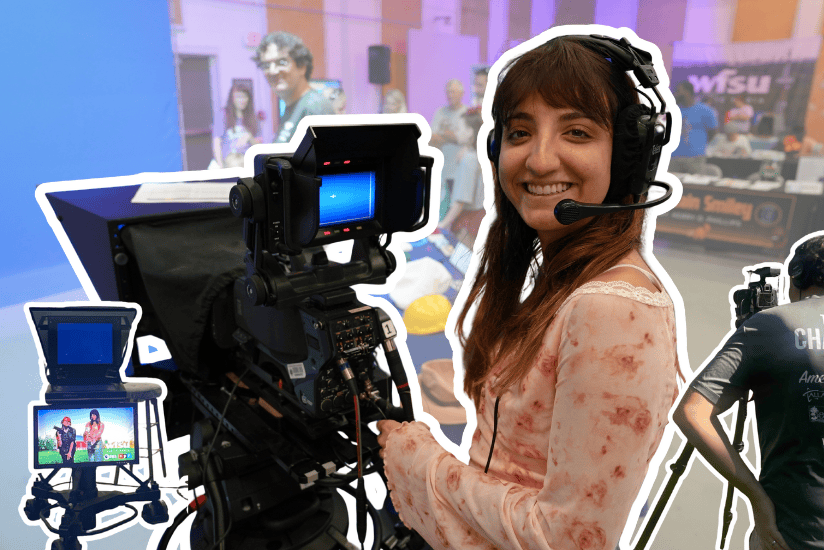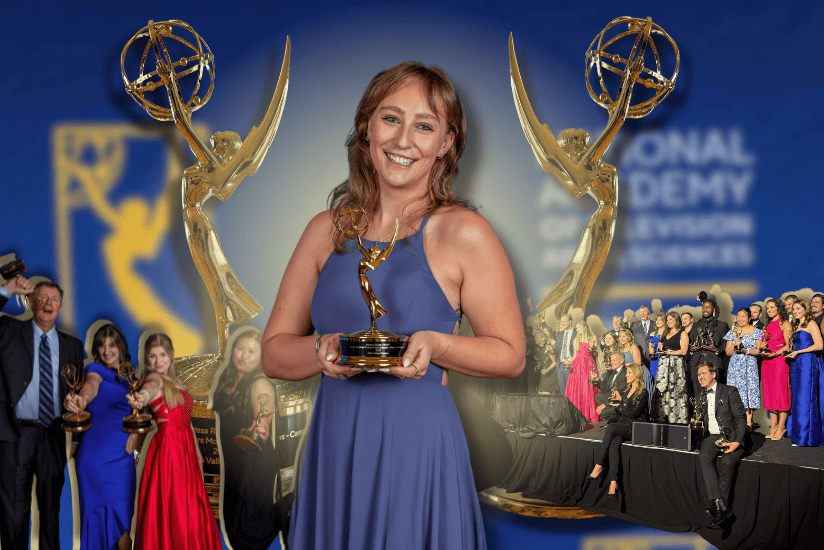The Graduate Certificate Program in Digital Video Production is a response to the changing technological landscape of our mediated world.
The Digital Video Certificate Program is a response to the changing technological landscape of our mediated world. As the cost of video production equipment – from cameras to non-linear editing software packages – continues to drop, and the quality of the digital media tools continues to increase, the boundaries between media producers and consumers is increasingly blurred. From webcams to consumer digital still cameras that capture motion and sound to phones that capture video, video cameras are proliferating across our social world. Similarly, both Apple and Windows operating systems come bundled with iMovie or MovieMaker, simple non-linear editing tools.
In addition to the proliferation of video technology, there is a similar proliferation of distribution possibilities. From streaming video on the Internet to homemade DVDs, video production has moved beyond the traditional television studio and is now accessible to businesses large and small, non-profit organizations, as well as an emerging group of visual artists and moviemakers. Digital media production is no longer the sole province of media corporations but instead is appearing in a growing diversity of places. Currently, these changes are not being met within the academy. Students today are still faced with the limited choices of taking on a full Film Production MFA or following a traditional path of research and theory offered by most MA and PhD programs. This certificate will allow graduate students the opportunity to gain the valuable, fundamental skills of digital video production and then apply those skills across a range of disciplinary applications. Visual anthropologists, ethnographers, sociologists, marketers, small business owners, and new media artists are all examples of potential students in the certificate program.
The new possibilities posed by accessible technology require a new set of skills to be able to use these tools effectively. In effect, we are reaching a stage where media literacy involves writing as well as reading visual media. The ability to construct visual narratives, tell a story in pictures and move digital sound and images across a host of media platforms is an increasingly valued skill set. This certificate will give people the training they need to become media literate in the 21st century.
Related News
The Certificate in Digital Video requires the completion of 4 courses (12 hours). These courses are available in lecture formats only.
Eligible course credits may be counted towards both the certificate and the degree program: Courses within the certificate program may be applied towards completion of degree programs and applied towards completion of certificate program requirements, depending on specific program requirements, course grades and the status of the student. Where approved, credits earned through this Digital Video Certificate program may be used to supplement a program of studies from others disciplines at FSU (see the courses included in the certificate program in the Program of Studies section of this document). Students should consult their advisors or graduate coordinators to determine if the certificate program classes can also be used in their specific graduate programs.
This certificate has three main areas of study; Foundations of Digital Media, Digital Video Specialization and Communication Theory. Students are required to complete 12 hours of courses by following the program of studies and selecting courses (credit hours) from each of the three areas of study. Three credit hours of Foundations of Digital Video are required, along with two courses (six credit hours) from Digital Video Specialization and one course (three credit hours) from Communication Theory. One transfer course or one course substitution (three credit hours) may be allowed to apply towards the certificate program.
Recommended Course Sequence
1) COM 5364 Foundations of Digital Media (Required Course)
2) RTV 5575 Digital Post Production/Advanced Post Production
3) COM 5401 Analysis of Communication Theory
4) RTV 5333 Documentary Video Production
Program of Studies
AREA 1 – Foundations of Digital Media (3 Credit Hours; required)
COM 5364.Foundations of Digital Media (3). This course provides an introduction to the fundamentals of digital video production. Topics include concepts of videography, video editing, and soundtrack design.
AREA 2 – Digital Media Specialization (6 credit hours; choose two)
COM 5365.Computer Graphics and Animation (3). This course provides an introduction to the construction of graphics and animation using digital software tools. There are three primary areas of focus: 1) the manipulation of still images; 2) the creation of moving images using digital software tools; and 3) the enhancement of digital video through special effects.
COM 5400r. Seminar in Communication Theory (3). This course is an analysis of existing theoretical perspectives and new developments in communication theory. May be repeated to a maximum of nine semester hours. Duplicate registration is allowed.
RTV 5333.Documentary Video Production (3). This course offers instruction in the theory and practice of production of non-fiction documentary video. Students produce a final video product and a research paper after studying the documentary tradition, theory, and history.
RTV 5575. Digital Post Production/Advanced Post Production (3). This course will cover a broad range of post-production topics, including compression and codecs, video editing, basic motion graphics, color correction, audio editing, and exporting. This course will include instruction in industry-standard software, and will also be balanced with exploration of the aesthetics and various theories of editing.
RTV 5596. Immersive Video Production (3). Prerequisite: Admission to the Public Interest Media and Communication major, or instructor permission. This course explores a range of new camera technology and software that allows for the post-production of immersive media, and identifies best practices for producing, shooting, editing and displaying immersive video products.
RTV 5605. Advocacy Video Theory and Practice (3). Prerequisite: Admission to PIMC major or instructor permission. This course explores the theory and practice of short-form video production. The course also examines the social media distribution possibilities for these videos.
RTV 6425r. Advanced Seminar in New Communication Technologies (3–6). This course is a doctoral-level seminar in the use of new communication technologies for information and entertainment. May be repeated to a maximum of six semester hours.
VIC 5006.Visual Communication (3). This laboratory focuses on the creation and analysis of visual messages. Emphasis is placed on visual literacy, message construction, and interpretation.
AREA 3 – Communication Theory (3 credit hours; choose one)
ADV 5503. Media Consumer Behavior (3). This course deals with the research and analysis of consumer behavior.
COM 5235. Crisis Communication (3). This course, a seminar centered on the theoretical frameworks used in crisis communication, focuses specifically on the analysis of research conducted for the main components of a crisis (messages, responses strategies, publics_ during all phases of a crisis (pre, post, during).
COM 5401.Analysis of Communication Theory (3). Analyzes the field of communication through the study of key theories of human communication research.
COM 5426.Media, Culture, and the Environment (3). This course examines the role of language and representation in our understanding of the natural world. The course also examines news media coverage of environmental issues, environmental images in popular culture, as well as the communication strategies of environmental organizations.
COM 5546.Political Communication (3). Course provides students with insight into roots and bases of political communication.
COM 6015.Gender and Communication (3). This course explores contemporary perspectives on the relationship between gender and communication in three areas: (1) the nature of gender; (2) the construction of gender in the media; and (3) gendered communication within “queer” culture.
COM 5400r.Seminar in Communication Theory (3). Analysis of existing theoretical perspectives and new developments in communication theory. May be repeated to a maximum of nine semester hours. Duplicate registration is allowed.
MMC 5600.Mass Communication Theory and Effects (3). An analysis of historical and current theories of mass communication with an emphasis on media effects.
MMC 5646.Political Economy of Media (3). This course covers the structure and functions of U.S. and other mass communication systems and their relationship to the political and economic systems.
SPC 5545.Studies in Persuasion (3). Lecture, readings, and discussion of human behavior theories as applied to persuasive communication.
Definition of Prefixes
COM—Communication
MMC—Mass Media Communication
RTV—Radio-Television
SPC—Speech Communication
VIC—Visual Communication
NOTE: The deadline to apply for the Certificate is before the completion of the first course. Students MUST apply before starting their second course.



